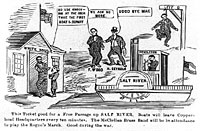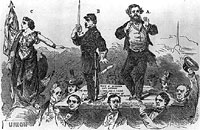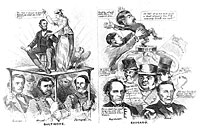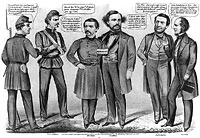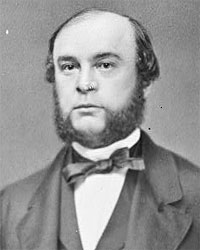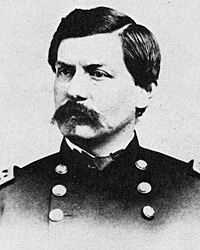During 1864, two curious outreach efforts were made by Republicans close to President Lincoln to influence the Democratic ticket. One was made by Postmaster General Montgomery Blair. The other by New York editor and political leader Thurlow Weed. Both were Republican conservatives who had problems with the pace of emancipation. According to Weed biographer Glyndon Van Deusen, “Weed conferred with Dean Richmond, Peter Cagger and other Democratic leaders during the summer of 1864 in an effort to get a democratic nomination that would not be based upon peace and disunion. It is possible that Lincoln approved this step as one of simple patriotism, but what must he have thought of a statement that Weed published some two weeks before the Democratic national convention flaying the abolitionist influence at Washington and declaring that, if the Democrats would nominate a man who would agree to prosecute the war on the basis of reunion rather than subjugation of the South and interference with established state institutions, he would give his ‘voice and vote for such a candidate’? Weed was ready to switch parties, if the Democrats would accept his definition of the objects of the war.”1
The Democrats, divided by issues of war and peace, sought a strong candidate backed by a unified party, wrote historian Ernest A. McKay. “They had serious issues to present to the electorate such as arbitrary arrests, individual liberty, and compromise with the South. These were popular themes, but Democratic drive was diluted by fear of overstepping the bounds of criticism into treason.”2
George B. McClellan’s presidential potential had been anticipated by conservative Democrats in late 1861. Historian George Milton Fort noted that such leaders, many of them from New York “visited Washington in December, 1861, and again in January, February and March of the next year. They found Stanton pretending to help the conservative Democratic General and the same time giving every aid possible to the Radicals. They also found that McClellan himself had by no means as much caution in his conduct in things political as he showed in beginning the Richmond campaign.” McClellan proved militarily slow and politically maladroit — especially after a visit from Mozart Hall leader Fernando Wood. “McClellan soon began to express ultraconservative political views, and eventually forced Lincoln to withdraw all confidence in him,” wrote Milton.3
Criticism of General McClellan among Radical Republicans began growing in the fall of 1861 as the Army of the Potomac sat inactively outside Washington. The Democrats responded to the criticism by adopting him as their champion. “It had not been hard for the personal entourage which remained with him to present him as a martyr of partisan politics, an example of a military genius who had been thrown to the Radical wolves. Many of the War Democrats took up his cause with relish. Horatio Seymour was not among these, for he had a distrust of the General, growing out of the latter’s high-handed course in Maryland in the fall of 1861,” wrote George Milton Fort. “The leaders of the New York Democracy had been looking for a better candidate for some months. In addition to the Governor, the two most important Democratic chieftains in the Empire State were August Belmont, the sagacious financier from Frankfort on the Main, who had succeeded Dean Richmond as chairman of the Democratic National Committee; and Samuel J. Tilden, then entering the great period of his career as astute lawyer, organizing politician, and conservative statesman. These four men had been chosen by the New York State Democratic Convention, meeting at Albany on February 23, as delegates at large from the State. The whole delegation had been put under the unite rule, and these men were virtually empowered to cast its vote.”4
The vote they cast was clearly going to be for George B. McClellan. On September 8, 1863 shortly after Mr. Lincoln had reappointed General George B. McClellan to resume command of the Army of the Potomac, Barney came to the President’s office while he was meeting with some Cabinet members. According to Navy Secretary Gideon Welles: “Barney said he had mingled with all descriptions of persons, and particularly with men connected with the army, and perhaps could speak from actual knowledge of public sentiment better than either of us. He was positive that no one but McClellan could do anything just now with this army. He had managed to get its confidence and meant to keep it, and use it for his own purposes. Barney proceeded to disclose a conversation he had with [S.L. M.] Barlow, some months since. Barlow had been to Washington to attend one of McClellan’s grand reviews, when he lay here inactive on the Potomac. McClellan has specially invited Barlow to be present, and during this visit opened his views — said he did not wish the Presidency, — would rather have his place at the head of the army, etc., etc., intimating he had no political views or aspirations. All with him was military, and he had no particular desire to close this war immediately, but would pursue a line of his own, regardless of the Administration, and its wishes and objects.”5
In late September 1864, President Lincoln told aide John Hay why he had dismissed McClellan in November 1862. “After the battle of Antietam, I went up to the field to try to get him to move & came back thinking he would move at once. But when I got home he began to argue why he ought not to move. I peremptorily ordered him to advance. It was 19 days before he put a man over the river. It was 9 days longer before he got his army across and then he stopped again, delaying on little pretexts of wanting this and that. I began to fear he was playing false — that he did not want to hurt the enemy. I saw how he could intercept the enemy on the way to Richmond. I determined to make that the test. If he let them get away I would remove him. He did so & I relieved him.6
New York Democrats had taken an active role in recruiting and promoting General George B. McClellan for President. McClellan declined to seek a new Army command — either because of pride or a desire to pursue political options. After being removed by President Lincoln in November 1862, he moved briefly to Trenton and then to New York City. McClellan biographer Stephen W. Sears wrote that McClellan “was courted by Democrats of every station. New York’s newly elected governor, Horatio Seymour, arranged to confer with him, as did August Belmont, national chairman of the party, John Van Buren, state chairman, and Dean Richmond, a leading party strategist. He became close to the editors of the two leading Democratic papers, Manton Marble of the World and William C. Prime of the Journal of Commerce. He was seen regularly with such major corporate and financial figures — and party supporters — as Samuel Barlow, William Aspinwall, John Jacob Astor, and William B. Duncan. Presently they demonstrated their admiration for him by the gift of a handsome, fully furnished, four-story brick house on West 31st Street, in one of Manhattan’s most desirable residential areas.”7
Belmont biographer David Black noted by 1864: “For two years August had been squiring General George B. McClellan around York, taking him to balls and the opera and, with Barlow and Marble, wining and dining him. Clams, mignons, truites avec sauc portugaise, terrapine en croustade, poulets de grains truffés….They were fattening him for the political kill.”8
McClellan’ s chief advocates were friend Samuel L.M. Barlow, Samuel J. Tilden, Sanford E. Church, New York Democratic Chairman Dean Richmond, and Democratic National Chairman August Belmont — and Belmont’s journalistic subsidiary, the New York World edited by Manton Marble. They sought to pacify McClellan, who grew anxious as the Democratic National Convention approached. McClellan biographer Stephen W. Sears wrote: “Marble and other supporters hastened to assure him that he would not become the captive of the peace wing. All signs pointed to victory, Marble told him on August 10; he had only to do nothing and say nothing for nineteen more days, and the nomination would be his.9
On August 29, journalist Noah Brooks sent information on the Chicago Convention to the White House in response “to the expressed wish of the President”. Brooks wrote that it was “true that the popular current is all in favor of McClellan and it appears to be a foregone conclusion that he will be nominated. The Northwestern States are not generally in his favor, but a majority of New York are, and a powerful outside influence is at work for him. Auguste [sic] Belmont, with plenty of money to use, heads the McClellan interest, and Cox, Dean Richmond and others are his able colleagues. They have music, fireworks &c, and they run the outside show of Saturday last, when Amos Kendall presided over a convention of “Conservatives”, which nominated McClellan.”10 Brooks wrote that at the passage of the platform, Belmont “looked profoundly sad.”11
“Everyone knew that McClellan would be nominated, behind whom stood a half-dozen influential New Yorkers,” wrote historian Allan Nevins. “The two opening speeches were floridly rhetorical. August Belmont, national chairman, predicted that Lincoln’s reelection would mean ‘the utter disintegration of our whole political and social system,’ while [William] Bigler lamented that the land was ‘literally drenched in fraternal blood.’ Then Horatio Seymour seized the gavel of permanent chairman for another burst of sound and fury.”12 Seymour biographer Stewart Mitchell wrote:
To block the program of Vallandigham, on the one hand, and the nomination of McClellan, on the other, he had nothing more than his own prestige and the name of Samuel Nelson. As the obvious leader of the Constitutional opposition to the policies of the radical Republicans Seymour was a person of importance and promise. He might easily have managed his own nomination; that he was unwilling to do so is proved first, by his going to the convention as a delegate, and second, by his acceptance of the permanent chairmanship. His journey into the West was marked with a series of ovations at every stop, and “especially at Detroit, crowds, cheers, speeches, and salvos of firearms greeted him.”13
Just as New Yorkers had played the leading roles at the Republican National Convention in June, New Yorkers played the key roles at the Democratic Convention — National Chairman August Belmont, Convention chairman Horatio Seymour, McClellan strategists Samuel L. M. Barlow and Manton Marble
Mitchell wrote that when Seymour “went up to take his place as presiding officer of the convention, a storm of cheers followed him from the floor. Not only could he have headed the ticket if he had been willing, but, what is more important still, he might have written the platform. Defeat in the assembly elections of 1863 and the stubborn accusation that he was working all the while for himself in 1864 seem to have made him the victim of his own indecision.”14
McClellan’s path to the nomination was impeded by two forces — Peace Democrats led by Ohio’s Clement Vallandigham and the potential presidential candidacy of New York’s own Governor Horatio Seymour. Historian William Frank Zornow wrote: “The launching of the Seymour boom at the preconvention caucuses was largely the work of Fernando Wood. Seymour had no great affection for the New York Copperhead leader or for the cause he represented, but he made no effort to prevent the use of his name by men whom he despised. Wood probably had no interest in Seymour, but was using him largely to kill off McClellan’s chances. During the convention Wood was alleged to have remarked, ‘I don’t care five cents for Seymour: he is only a convenient tool just now.’ There were high hopes among anti-McClellan men that New York might be induced to give a complimentary vote for Seymour on the first ballot and thereby prevent the General from receiving the two-thirds vote necessary for nomination. Many delegates from Ohio were also actively working to induce others at the convention to cast a complimentary vote for Seymour.”15
Historian Sidney David Brummer wrote: “About a week before the delegates gathered in Chicago, the [Albany] Argus came out with an authoritative announcement that Governor Seymour would not be a candidate for the presidency. Yet, when the convention met, the peace men led by the two Woods revived the talk of naming Seymour with the intention probably of using him to kill of McClellan. Around the hotels the anti-McClellanites talked much, and betting by outsiders that McClellan would not be nominated was lively. Dean Richmond, however, was firm for the General, and a majority of the New York delegation was for him. On Saturday, August 27th, the delegation was for him.”16 When Amasa J. Parker cast New York’s votes for President, he expressed regret for New York State “passing by her favorite son, who disclaims the candidacy.”17 During a lull in the convention proceedings, Governor Seymour delivered a brief speech:
Some gentlemen have done me the honor to present my name in connection with the office of President of these United States. It would be affectation on my part to say that these evidences of regard did not give me great pleasure; but many months since I announced my friends in the State of New York that I could not, for reasons of both public and private character, be a candidate for that high office. Having thus advised life-long friends of my purposes, those to whom I have been under so many great and enduring obligations, it would not be honorable on my part to allow my name to be brought forward under circumstances of apparent antagonism to them, when their views and commitments led them in another direction. [Cheers.] As a member of the New York delegation, I thought it would be advisable to place in nomination for the Presidency, an eminent jurist of that State. [Cheers.] I was led to that conclusion, not by any doubt of the ability and patriotism of General McClellan, or from any want of regard for his person or character, for I cherish a warm attachment for both. I know from his declaration to myself and others that it would be more agreeable to him to resume his connection with the army of his country, than to occupy the Presidential chair; but the wishes of the people have decided that it should be otherwise. [Applause.]I wish to say a few words with regard to the objections which have been urged against his nomination, and which have caused some excitement in this convention. I speak more particularly of the objections urged by the delegation from Maryland. I did to one of its members an act of injustice by a decision, because I did not understand the purport of his remarks. It is due to him, that I should say, that I am confident that he never meant to take part in the proceedings of this body, without submitting in an honorable manner to its decisions. [Cheers.] With respect to the orders issued by General McClellan affecting the citizens of that State, I must say that I do not approve of them; but they must not be viewed in the light which events have since thrown upon the policy of the administration. At that time the wisest and best men of our country had confidence in its purposes. Then, the President denounced measures which he has since adopted; then the friends of the Union in the border States were listened to by him, with every appearance of respect and deference. The mask had not been thrown off, and obedience to his orders did not imply hostility to the rights of States. We must bear in mind how at that moment the public was convulsed by a condition of affairs without precedent, and by questions which were suddenly forced upon the public attention, and with regard to which, public men were compelled to act without time for reflection. What man can say after looking back over his own action during the past three years, that he had not fallen into many and grave errors with respect to his duty? God knows, I cannot, after reviewing my own official conduct, which was ever governed with an earnest and prayerful desire to do what was right. [Cheers.] I cannot say that all my official action has been such, as at this time to commend itself as at this time to commend itself even to my own approval.18
Historian David E. Long presented a more ambitious view of Seymour’s prospects. Long wrote that “the Democrats had problems. Two in particular threatened to derail McClellan. First, McClellan supporters were primarily from the East. The only McClellan advocate not from New York was Samuel Sunset Cox of Ohio, and though the McClellan managers knew that a number of Midwestern delegates were from the peace wing, they badly underestimated this group’s strength. They were a far more numerous minority, if they were a minority at all, than any of the McClellan people anticipated, and they closed around Vallandigham.” According to Long, “The second problem was that former Governor Horatio Seymour of New York, having previously announced his unavailability, was now willing to be drafted. Seymour was a formidable candidate and the Copperheads preferred him to McClellan. McClellan’s managers immediately began attempting to hold the first-ballot commitments they had, to seek favorite-son delegates who would promise second-ballot support, and assure an early McClellan nomination with as little friction as possible. In the process, they completely neglected what would prove to be the most important aspect of the convention, the Committee on Resolutions, or, as it was more commonly known, the platform committee.”19
Seymour’s candidacy died when the New York State delegation caucused on August 27 and Seymour protested that he was not a candidate. “The prolonged session of the New York delegation without taking a vote for a candidate revived the hopes of the opponents of McClellan that New York might give a complimentary vote to Seymour. Though the delegations of every state, save New York, Kansas, and Iowa had now caucused, with the result that McClellan could hardly obtain the necessary two-thirds vote. Yet this by no means meant that Seymour would be nominated — a fact which the Regency leaders doubtless considered,” wrote historian Sidney David Brummer. “On the following Monday morning the New York delegation again met. Seymour made a speech declaring that he had no idea of allowing the use of his name for the presidential nomination.”20
Although Seymour’s candidacy never developed, McClellan’s allies failed to win a platform fight with Peace Democrats but won a first-ballot nomination for McClellan. Noah Brooks wrote presidential aide John G. Nicolay: “The nomination of McClellan was a foregone conclusion, the only possible obstacle thereto being the deep determination of the ultra “peace” men to carry all the points which they could. And, failing in defeating his nomination, they secured all possible concessions in the platform, which was the work of [Clement] Vallandigham and [John] Weller of California. There was a prolonged and bitter struggle, however, over the platform while it was in the hands of the committee and the subcommittee, but the “peace” men finally triumphed, yielding their adhesion to McClellan for availability’s sake.”21
According to journalist Brooks, “Gov Seymour refused to have the seven votes cast for him be announced as his, and they were read by the secretary as having been given to [Connecticut’s] T[homas]. R. Seymour, much to the disgust of those who threw them. He was chagrined and disappointed at not being at least a prominent candidate, but his prospects were very good on the night of the second day, when Long and Harris made their attacks on McClellan; he artfully allowed them all possible advantage, and by permitting them to speak, though not in order, succeeded in staving off the nomination for that night at least, and the Seymour men were in excellent spirits when the convention adjourned for that day, without making any nomination. During that night the McClellan men, alarmed, made several trades one of which was the vote of New York for Pendleton. It is also said that a written agreement was given to Seymour (by whom signed I know not) covenanting that he would have the portfolio of Secretary of State, in the event of McC-s election.””22
To add insult to the Peace platform, Democrats put a Peace Democrat, Ohio Congressman George H. Pendleton, on the ticket for Vice President. Journalist Noah Brooks wrote: “It had been early conceded that a border state would have the vice presidency certainly, in the event of McClellan’s nomination, but, to secure the “peace” men, it was necessary to give it to Pendleton, who traded for it by bringing over his forces for McClellan. New York City made the trade throughout and Belmont and Dean Richmond, who managed for McC— , gave the vote of their State to Pendleton on condition that he brought his strength over to McClellan.”23
The unlikely combination presented a real problem for McClellan — how to balance his own beliefs with the platform of the party. It took six drafts for McClellan to write an acceptable letter of acceptance in which he stated the need to “secure such peace, reestablish the Union, and guarantee for the future the Constitutional rights of every State.” August Belmont biographer David Black wrote: “The peace plan in the Democratic party platform was alienating War Democrats and anti-Lincoln Republicans, who may have considered voting for McClellan. August urged the general to clarify his position on the plank: ‘It is absolutely necessary that in your reply of acceptance of the nomination you place yourself squarely and unequivocally on the ground that you will never surrender one foot of soil and that peace can only be based upon the reconstruction of the Union. In other words, cessation of hostilities or an armistice can only be agreed upon after we have sufficiently guarantee from the South that they are ready for a peace under the Union.'”24
“New York City is shouting for McClellan,” reported Gideon Welles in his diary on September 3.25 A colleague of Francis P. Blair, Sr. Wrote: “New York is crowded with Secesh who will vote and pay for McClellans Election.”26 New York was the object of political speculation in Washington. “I see, in theChronicle, an account of a new movement in Politics, to weaken the Democratic nomination. It is headed by many of the most prominent democrats in the city and State of New York — such as F. B. Corning, Moses Taylor, Edwards Pierrepont, John A. Dix, and the like,” wrote Attorney General Edward Bates in his diary. “This movement is not only formidable to the McClellanites for the names enlisted against them; but the fact of such a move at New York and at this time, is proof that the Democracy has no power of unity and cohesion[.]”27
Footnotes
- Glyndon Van Deusen, Thurlow Weed: Wizard of the Lobby, p. 310.
- Ernest A. McKay, The Civil War and New York City, p. 237.
- George Fort Milton, Abraham Lincoln and the Fifth Column, p. 100.
- George Milton Fort, Abraham Lincoln and the Fifth Column, p. 219-220.
- Gideon Welles, Diary of Gideon Welles, Volume I, p. 116-117 (September 8, 1862).
- Michael Burlingame and John R. Turner Ettlinger, editor, Inside Lincoln’s White House: The Complete Civil War Diary of John Hay, p. 232 (September 25, 1864).
- Stephen W. Sears, George B. McClellan: The Young Napoleon, p. 345.
- David Black, The King of Fifth Avenue, p. 241-242.
- Stephen W. Sears, George B. McClellan: The Young Napoleon, p. 369.
- Abraham Lincoln Papers at the Library of Congress. Transcribed and Annotated by the Lincoln Studies Center, Knox College. Galesburg, Illinois. (Letter from Noah Brooks to John G. Nicolay, August 29, 1864).
- Noah Brooks, Washington in Lincoln’s Time: A Memoir of the Civil War Era by the Newspaperman Who Knew Lincoln Best, p. 168.
- Allan Nevins, The War for the Union: The Organized War to Victory, 1864-1865, 1864-1865, p. 98.
- Stewart Mitchell, Horatio Seymour of New York, p. 365.
- Stewart Mitchell, Horatio Seymour of New York, p. 365-366.
- William Frank Zornow, Lincoln & the Party Divided, p. 130.
- Sidney David Brummer, Political History of New York State During the Period of the Civil War, p. 403.
- Stewart Mitchell, Horatio Seymour of New York, p. 370.
- Stewart Mitchell, Horatio Seymour of New York, p. 370-371.
- David E. Long, The Jewel of Liberty, p. 61.
- Sidney David Brummer, Political History of New York State During the Period of the Civil War, p. 404.
- Abraham Lincoln Papers at the Library of Congress. Transcribed and Annotated by the Lincoln Studies Center, Knox College. Galesburg, Illinois. (Letter from Noah Brooks to John G. Nicolay, September 2, 1864).
- Abraham Lincoln Papers at the Library of Congress. Transcribed and Annotated by the Lincoln Studies Center, Knox College. Galesburg, Illinois. (Letter from Noah Brooks to John G. Nicolay, September 2, 1864).
- Abraham Lincoln Papers at the Library of Congress. Transcribed and Annotated by the Lincoln Studies Center, Knox College. Galesburg, Illinois. (Letter from Noah Brooks to John G. Nicolay, September 2, 1864).
- David Black, The King of Fifth Avenue, p. 252.
- Gideon Welles, Diary of Gideon Welles, Volume II, p. 135 (September 3, 1864).
- Howard K. Beale, editor, The Diary of Edward Bates, p. 42 (October 24, 1864).
- Abraham Lincoln Papers at the Library of Congress. Transcribed and Annotated by the Lincoln Studies Center, Knox College. Galesburg, Illinois. (Letter from John M. Forbes to Francis P. Blair Sr., September 18, 1864).






